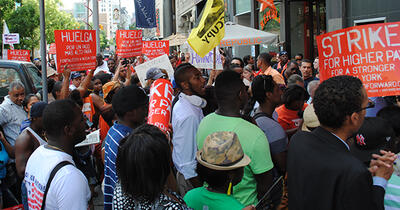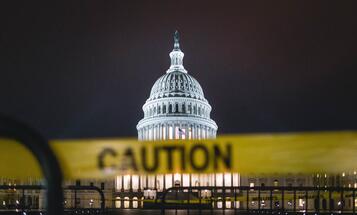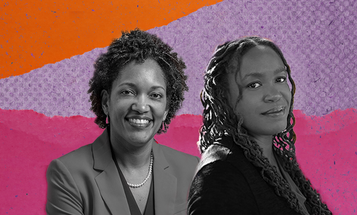
Second Striketober Shows Growing Power of Organized Labor
This recent wave of organizing is a direct response to corporate consolidation of power that has harmed Black and brown workers across the country.

For the second October in a row, workers have taken to the streets, or threatened to do so, to push back against exploitative—and sometimes illegal—labor practices. This month, staff at the Philadelphia Museum of Art ended their three-week strike after finally reaching a tentative contract following two years of negotiating. Nurses in Minnesota and airport staff at San Francisco International Airport went on strike. Rail workers are threatening to walk off the job. In San Francisco, ride-sharing and delivery workers rallied outside Uber’s headquarters to urge the company to recognize a new statewide union fighting for better wages and protections for gig workers. Amazon workers have staged walkouts in pursuit of decent pay, safe working conditions, and workplaces free from discrimination and harassment.
Over the past two years, as executives and CEOs stuffed their pockets with profits, workers were left behind.
This recent wave of organizing is a direct response to corporate consolidation of power that has harmed workers across the country, especially Black and brown workers. Over the past two years, as executives and CEOs stuffed their pockets with profits, workers were left behind. Shareholders from the largest 22 companies that employ frontline workers grew $1.5 trillion richer, while their 7 million workers—a majority of which are Black and brown—received less than 2 percent of those gains. Corporate concentration has reached levels not seen since before the Great Depression, and the size of these companies has made it even harder to organize, as monopolies have seemingly endless funding for union-busting and other anti-worker schemes. These companies are often enabled by policymakers who block critical—and popular—legislation that would curb their outsized power.
But there is always hope in people power. Workers across the country are demanding what should be a minimum for any employee: fair treatment, fair working conditions, and fair pay. They are unionizing some of the largest companies in the country and doing it in historically non-union sectors. This year has brought first-time unionization efforts at Apple, Chipotle, and Trader Joe’s, along with a historic win by Amazon workers as they voted to form the first-ever union in the company’s history. More than 300 Starbucks stores in nearly three dozen states have held union elections, with 80 percent of them voting in favor of forming a union. And in November, workers at a Home Depot in Philadelphia will vote on whether to make theirs the company’s first unionized U.S. store.
As workers continue to organize in new places, they’re also pioneering new negotiation models, like expanded bargaining, that allow labor to better build and share power throughout the economy, from the workplace to the housing and credit markets.
Black and brown workers have been at the center of this new wave of organizing. The covid pandemic only amplified how Black and brown workers have been persistently disempowered on the job, and the recovery has still left millions of these workers behind as gaps in overall employment and in wages persist and widen. It is no wonder, then, that the labor movement is increasingly made up of people of color: as of 2020, 10.6 million of the 15.9 million people in unions were women or people of color.
Expanding worker power is essential to building an economy that works for everyone, not just those at the very top.
Expanding worker power is essential to building an economy that works for everyone, not just those at the very top. When workers have a seat at the table to negotiate over wages and working conditions, it helps hold corporations accountable and can have ripple effects in workplaces across the country. Union membership also significantly increases wealth for all households, with Black and Latinx families standing to gain the most. It's not just unionized workers who benefit from organizing. Research shows that unions have a substantial and positive impact on the compensation and work lives of both unionized and non-unionized workers.
Sustaining the momentum of today’s labor movement requires policymakers to fix our broken labor laws, and pass legislation that makes it easier to unionize workers. Legislation like the PRO Act would do just that, complementing workers efforts to build power by making it easier for workers to unionize while helping to curb the power of billionaires who profit from exploitation. Workers may not have millions to spend on lawyers and lobbyists, but they have an even more resilient and powerful force: solidarity.




